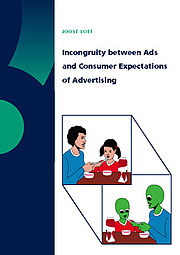Incongruity between Ads and Consumer Expectations of Advertising Defended on Thursday, 26 September 2002
The effectiveness of advertising is a topic of interest to both marketing research and advertising practice. Many advertising theories specify that effective ads, i.e., ads that result in favorable brand attitudes, should match consumer brand expectations. Implicit in these theories is the assumption that consumers use their brand schemas in ad processing. Alternatively, however, consumers may use their ad schemas in ad processing. Especially in a cluttered media environment consumers have formed expectations of advertising in particular product categories. In this thesis, we consider both the origins of consumer expectations of advertising and study the effects of ads that are incongruent with such advertising expectations. We find that ads that match consumer brand expectations are only more effective than brand-mismatching ads if the brand schema is salient in ad processing. The requirement of schema salience is more strict than the brand awareness requirement that is part of the aforementioned advertising theories. If consumers use their ad schemas in processing advertising, brand-matching does not affect consumer evaluations of brands and ads. Contrary to incongruity with the brand schema, incongruity with the ad schema is evaluated favorably. This is explained by the way in which consumers determine incongruity with the brand schema and incongruity with the ad schema. Consumers only consider ad relevancy to the brand in case of incongruity with the brand schema. In line with this reasoning, we find that incongruity with the brand schema mainly has cognitive consequences, whereas incongruity with the ad schema predominantly has affective consequences.
Keywords
Consumer expectations, Brand schemas, advertising, Attribute typologies, Chain theory, Advertising grids, Rossitet-Percy Grid, ad processing, ad scenarios, incongruent advertising









